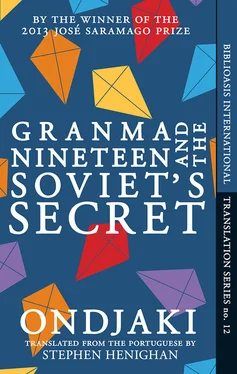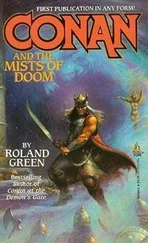3.14 released my sweating hand. We had spent the whole time kneeling, concentrating on simultaneously feeling the fear created by the enormous explosion and all the colours entering our open eyes and mouths. Even today I don’t know how to explain the fact that we didn’t even speak about how our hearts had beaten so fast when we stood up on aching legs, both of us with tears in our moist eyes as we saw, dexploded at night in that way, our beloved Bishop’s Beach covered with an ashen dust from the luminous explosion that had finally occurred.
A big explosion awoke other birds in the trees and the fish in the sea. We saw colours from a carnival of fire: yellows, reds pretending to be the colour of oranges in a green that was bluish without being aquamarine, all shining as they imitated stars that knew how to dance in a sky that was no longer dark from being so brightly lit up with our explosion, so beautiful from lingering in the noises and the pretty colours that our eyes looked upon, never to be forgotten in the passage of time — not for our whole lives.
The sky stayed lit up from other explosions almost without sound, a madness of brilliantly coloured patterns that I had never seen in the movies when the cowboys blew up mountains with more dynamite than we had used.
“Maybe there were other materials in the top of the cabinet.” 3.14 spoke in a very low voice. “It’s possible the other Soviet boxes had other things that shouldn’t be mixed with fire.”
“Shouldn’t be?” I smiled. “Of course they should be. Just look at how beautiful our sea is when it’s all aglow!”
Everyone looked at the lighted sky of Bishop’s Beach, that sky that gazed down at people who were still coming running from other streets to get to the square and have more space and more darkness to watch the ceiling of the city of Luanda.
People who had gone away came back. The Comrade Gas Jockey came running. From far off, he must have thought that the light of the explosion was one of his gas pumps, that someone had set down a lighted cigarette, or even that the Soviet dynamiting had already started. Others, elders, came to see up close, because from a distance they had thought that it was a fireworks show to commemorate some political date that they had forgotten about, or even something related to the Mausoleum itself; still others had said that the explosions could only be by order of the Comrade President, because fireworks shows that big and beautiful had never been seen in Luanda and had to be authorized by the political bureau of the Party.
Many adults arrived; even people from other neighbourhoods began to come down the long street from the Blue District.
During all this time, Granma Nineteen had stayed on her veranda. Then I saw her talking to Doctor Rafael KnockKnock, and her face took on a worried expression. Maybe Madalena had told her that we had gone out a long time ago.
I looked up at all of the windows of Granma Nineteen’s house, even at the window of Granma Catarina’s room: they were all shut to keep the dust out of the house. From five o’clock in the afternoon onwards, we were no longer allowed to open the windows, nor to leave the veranda door wide open. Only after the truck that damped down the dust had gone by, and if no mosquitoes had come in from the bushes, did Granma allow us to open the door a crack so that a cool breeze came in. But I figure Granma Catarina wasn’t there.
All of the children of Bishop’s Beach who had kites to fly began to arrive, as did the children from the Blue District and from Kinanga and from over by those thatched huts that were built right up against the sea. They all understood that the breath of wind was quickly going to increase in velocity, and that it was a beautiful night to set coloured kites flying where there were still reflections of the light of the fire in the sea, so close and so colourful.
In the midst of the chaos, Sea Foam became more excited. A chaos of people left Foam with a troubled look, and he fled away from the mob, just when we wanted to go and speak to him to know what he had seen from the other side of the storage shed, from which he had emerged with the parrots and other birds tied to his body. But he started to run again, disappearing down the other end of the beach, hauling everything, fowl and hens, cages and little birds, dragging, also, the chirping noises of all those beings which, imprisoned in their cages as they were by being attached to his body, must be dreaming of the moment when they would be able to fly home.
“He must be going to release the birds.”
“I never thought there were so many of them.”
“I never thought he’d come, too.” 3.14 looked in a different direction.
“Who?”
“The Boss General.”
He arrived in a different car, alone, coming down the hill very quickly and honking for people to get out of his way, stopped the car near the gas pump, got out with his tunic full of medals that shone almost like the tears in his eyes at his disbelief at the smoke and the ongoing noise of small explosions that greeted him.
“Cannot be…How explode like that?” He glanced at the people, who did not answer him. “Where is Comrade Dimitry, Comrade Bilhardov? What happen to Muzzleum?”
I saw glistening tears fall from his eyes. Maybe another general, more of a general than he, was going to bawl him out the next day or even that very night for not having had advance knowledge of the explosion of the Mausoleum on Bishop’s Beach.
“Kildren, every body can help. Must put out fire of Muzzleum.” Except that no one stirred. They just stood looking at him. “Must get water of sea. Put out fire of Muzzleum. Beautiful verk of Angolan people to remember President.” Now he spoke, now he shouted, as he cried like a child. “Every body get pail, put out fire, save verk of Muzzleum, so much verk of Soviet comrades…”
Many people didn’t even know who he was. They looked at him with pity, perhaps thinking that he was one of the diligent labourers who came early every day and left late, who ate the construction site’s dust and felt the sun’s heat on their heads, because some of them didn’t even have helmets: some, the Angolans, lived far away and left the site in the back of a big truck that possibly gave them a ride part of the way home; others, the Soviets, went to sleep full of sad nostalgia for their homeland in the far-away.
“Kildren.” He looked at us. “General want to ask question: who know Comrade Bilhardov? Does he hide in dog cage?”
I wasn’t going to reply. No one had spoken with him; but 3.14 couldn’t keep silent.
“Here in the street we only have parrot cages, Comrade Medalov.” 3.14 made the gang laugh.
“Attention, kildren!” The Boss General thought he was talking to his soldiers.
“Get lost, tupariooov, Russkie!”
We shouted in chorus and fled towards the sea, Pi, Charlita and I, in a sprint that imitated the birds. Even with our eyes closed, we still knew the way to the sodden sea.
But we didn’t see, in fact we never saw, what continued to occur there near the square. Each of us knows how to tell the story of every moment of that night, each conversation, because we spent many years putting together our versions of events and discovering things that only time brought to light, and in the end magic summoned the coming together of all of the people who had invented that explosion in Angolan colours at the Soviet construction site. We were still running towards the sea and not looking behind us. We didn’t know whether the Boss General was pursuing us nor whether Granma Nineteen wanted to call out to us because at last she had seen us, nor whether Granma Catarina was hiding behind the wooden shutters laughing at that night. We didn’t count how many parrots flew through the sky without colliding or losing altitude. We didn’t hear the noise of the birds that Foam released one by one, cutting their ropes and reciting verses of Cuban poems to give the birds strength, and frightening them with his loud voice, which at times is a way of telling a bird that fear is being close to humans, that they must fly far away to a home far away from the cities and the wars and the children’s pellet guns and the Soviets’ cages.
Читать дальше












